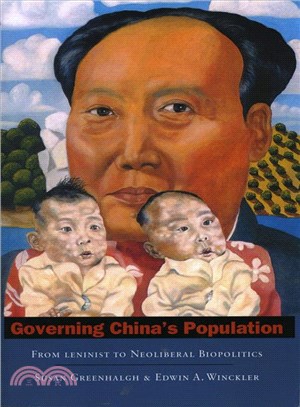Governing China's Population ─ From Leninist to Neoliberal Biopolitics
商品資訊
ISBN13:9780804748803
出版社:Stanford Univ Pr
作者:Susan Greenhalgh; Edwin A. Winckler
出版日:2005/09/16
裝訂/頁數:平裝/416頁
規格:21.6cm*14.6cm*2.5cm (高/寬/厚)
商品簡介
作者簡介
相關商品
商品簡介
China’s giant project in social engineering has drawn worldwide attention, both because of its coercive enforcement of strict birth limits, and because of the striking changes that have occurred in China’s population: one of the fastest fertility declines in modern history and a gender gap among infants that is the highest in the world. These changes have contributed to an imminent crisis of social security for a rapidly aging population, provoking concern in China and abroad. What political processes underlie these population shifts? What is the political significance of population policy for the PRC regime, the Chinese people, and China’s place in the world?
The book documents the gradual “governmentalization” of China’s population after 1949, a remarkable buildup of capacity for governance by the regime, the professions, and individuals. Since the turn of the millennium the regime has initiated a drastic shift from “hard” Leninist methods of birth planning toward “soft” neoliberal approaches involving indirect regulation by the state and self-regulation by citizens themselves. Population policy, once a lagging sector in China’s transition from communism, is now helping lead the country toward more modern and internationally accepted forms of governance. Governing China’s Population tells the story of these shifts, from the perspectives of both regime and society, based on internal documents, long-term fieldwork, and interviews with a wide range of actors—policymakers and implementers, propagandists and critics, compliers and resisters.
This study also illuminates the far-reaching consequences for China’s society and politics of deep state intrusion in individual reproduction. Like Mao’s Great Leap Forward, Deng’s one-child policy has created vast social suffering and human trauma. Yet power over population has also been positive and productive, promoting China’s global rise by creating new kinds of “quality” persons equipped to succeed in the world economy. Politically, the PRC’s population project has strengthened the regime and created a whole new field of biopolitics centering on the production and cultivation of life itself.
Drawing on approaches from political science and anthropology that are rarely combined, this book develops a new kind of interdisciplinary inquiry that expands the domain of the political in provocative ways. The book provides fresh answers to broad questions about China’s Leninist transition, regime capacity, “science” and “democracy,” and the changing shape of Chinese modernity.
The book documents the gradual “governmentalization” of China’s population after 1949, a remarkable buildup of capacity for governance by the regime, the professions, and individuals. Since the turn of the millennium the regime has initiated a drastic shift from “hard” Leninist methods of birth planning toward “soft” neoliberal approaches involving indirect regulation by the state and self-regulation by citizens themselves. Population policy, once a lagging sector in China’s transition from communism, is now helping lead the country toward more modern and internationally accepted forms of governance. Governing China’s Population tells the story of these shifts, from the perspectives of both regime and society, based on internal documents, long-term fieldwork, and interviews with a wide range of actors—policymakers and implementers, propagandists and critics, compliers and resisters.
This study also illuminates the far-reaching consequences for China’s society and politics of deep state intrusion in individual reproduction. Like Mao’s Great Leap Forward, Deng’s one-child policy has created vast social suffering and human trauma. Yet power over population has also been positive and productive, promoting China’s global rise by creating new kinds of “quality” persons equipped to succeed in the world economy. Politically, the PRC’s population project has strengthened the regime and created a whole new field of biopolitics centering on the production and cultivation of life itself.
Drawing on approaches from political science and anthropology that are rarely combined, this book develops a new kind of interdisciplinary inquiry that expands the domain of the political in provocative ways. The book provides fresh answers to broad questions about China’s Leninist transition, regime capacity, “science” and “democracy,” and the changing shape of Chinese modernity.
作者簡介
Susan Greenhalgh is population specialist and Professor of Anthropology at the University of California, Irvine. She was formerly China specialist and Senior Associate at the Population Council. Edwin A. Winckler is a political scientist and Research Scho
主題書展
更多
主題書展
更多書展今日66折
您曾經瀏覽過的商品
購物須知
外文書商品之書封,為出版社提供之樣本。實際出貨商品,以出版社所提供之現有版本為主。部份書籍,因出版社供應狀況特殊,匯率將依實際狀況做調整。
無庫存之商品,在您完成訂單程序之後,將以空運的方式為你下單調貨。為了縮短等待的時間,建議您將外文書與其他商品分開下單,以獲得最快的取貨速度,平均調貨時間為1~2個月。
為了保護您的權益,「三民網路書店」提供會員七日商品鑑賞期(收到商品為起始日)。
若要辦理退貨,請在商品鑑賞期內寄回,且商品必須是全新狀態與完整包裝(商品、附件、發票、隨貨贈品等)否則恕不接受退貨。
























